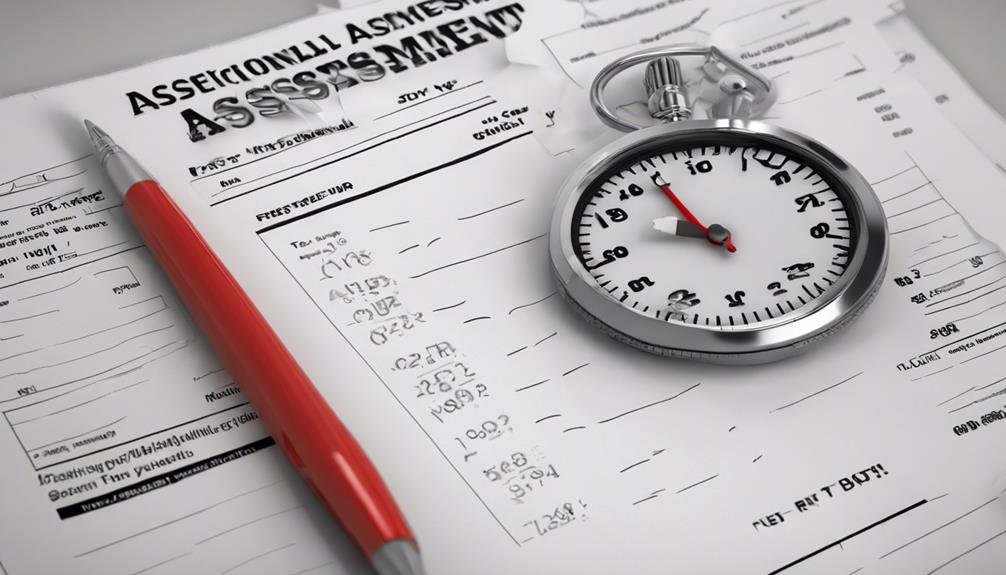Test-Retest Reliability in Personality Assessment
When considering the stability of personality traits over time, the concept of test-retest reliability is akin to a compass guiding researchers through the intricate terrain of personality assessment. However, as you navigate this terrain, you may find yourself pondering the extent to which external factors influence the consistency of personality measurements. By exploring the nuances of test-retest reliability, you can uncover insights that hold the key to unraveling the complexities of personality assessment.
Key Takeaways
- Consistency over time assesses stability.
- Participant factors impact reliability.
- Standardized tools enhance consistency.
- Proper research design ensures reliability.
- Standardized procedures minimize errors.
Importance of Test-Retest Reliability
Ensuring test-retest reliability in personality assessment is vital for establishing the consistency and stability of measurement over time. Long-term stability refers to the extent to which an individual's personality traits remain relatively constant over extended periods. By conducting assessments at different points in time, researchers can determine if the results remain consistent, indicating the reliability of the measurement tool.
Essential consistency is another critical aspect of test-retest reliability. It assesses how well different items within the same test measure the same underlying construct. High internal consistency suggests that the items are measuring the intended aspect of personality consistently, enhancing the overall reliability of the assessment.
Factors Influencing Reliability
To understand the reliability of personality assessment tools, it's essential to examine the various factors that can influence the consistency and stability of measurement over time.
Participant engagement plays an important role in test-retest reliability. Factors such as motivation, understanding of the assessment process, and willingness to provide honest responses can impact the reliability of the results. A participant who's disengaged or not fully committed to the assessment may provide inconsistent responses during different testing sessions, leading to reduced reliability.
Environmental factors also play a significant role in influencing reliability. Distractions, noise levels, and comfort of the testing environment can all affect how consistently a participant responds to the assessment. A noisy or uncomfortable environment may lead to increased variability in responses between test sessions, reducing the overall reliability of the assessment tool.
Ensuring a consistent and standardized environment across test-retest sessions can help minimize the impact of environmental factors on reliability.
Measurement Techniques and Tools
How do different measurement techniques and tools impact the reliability of personality assessments?
The choice of measurement techniques and tools plays an essential role in determining the reliability of personality assessments. When selecting tools for assessment, it's vital to take into account factors such as the validity of the instrument, the clarity of the items, and the potential for response bias. Utilizing standardized tools that have undergone rigorous validation processes can enhance the reliability of personality assessments.
Data analysis methods also greatly impact reliability. Employing appropriate statistical techniques can help identify and mitigate sources of error, improving the overall reliability of the assessment results.
Additionally, considering response bias is crucial when interpreting personality assessment data. Response bias occurs when participants provide inaccurate or distorted responses, leading to unreliable results. By addressing response bias through careful design and analysis, the reliability of personality assessments can be significantly improved.
Ultimately, the thoughtful selection of measurement techniques and tools, coupled with robust data analysis practices, is critical for ensuring the reliability of personality assessments.
Implications for Research Design
Choosing an appropriate research design is essential for conducting reliable and valid studies on personality assessment. Study replication is important in ensuring the reliability of findings. By replicating studies using the same experimental design and procedures, researchers can verify the consistency of results over time.
When designing research studies, considerations should be given to experimental design to control for potential confounding variables that could impact the results. Proper data analysis techniques should also be employed to accurately interpret the collected data and draw meaningful conclusions.
Understanding the research implications of different experimental designs is critical for drawing valid conclusions about personality assessment. Researchers must carefully consider the implications of their chosen design on the reliability and validity of the study results. By selecting appropriate research designs that align with the study objectives, researchers can enhance the overall quality of their research and contribute valuable insights to the field of personality assessment.
Enhancing Reliability Through Procedures
To enhance reliability in personality assessment, focus on ensuring consistency in the assessment process and implementing validity checks to verify the reliability of the measures used.
By establishing standardized procedures and protocols, you can minimize potential sources of error and increase the trustworthiness of your assessment results.
These steps are essential for maintaining the reliability of personality assessments over time and across different contexts.
Consistency in Assessment
By implementing standardized procedures in personality assessment, you can enhance the importance of results and improve test-retest reliability. Longitudinal studies have shown that stability over time is a key aspect of personality traits, emphasizing the significance of reliable assessment methods. Consistency in assessment is vital for accurately capturing an individual's traits and behaviors, especially when conducting repeated measurements.
Standardized procedures, such as using the same assessment tools and instructions across different assessments, help minimize variability in results. This consistency guarantees that any changes observed in personality traits over time are reflective of actual changes in the individual rather than inconsistencies in the assessment process.
By establishing a uniform testing environment and procedures, you can reduce the likelihood of measurement errors and enhance the reliability of your assessments.
Furthermore, maintaining consistency in assessment procedures allows for better comparability of results across different time points, facilitating a more accurate evaluation of personality trait development and changes. Overall, enhancing the importance of assessment through standardized procedures is essential for improving the reliability of personality assessments and ensuring the validity of longitudinal studies.
Validity Checks for Reliability
Maintaining reliability in personality assessments requires implementing validity checks to guarantee the consistency and accuracy of the assessment procedures. Vitality checks play an essential role in enhancing reliability by making sure that the assessment tools measure what they intend to measure effectively.
When evaluating test duration and response patterns, validity checks help confirm that the time allotted for the test is adequate and that participants are responding consistently across different items.
Moreover, validity checks contribute to establishing inter-rater agreement and internal consistency within the evaluation process. Inter-rater agreement ensures that multiple assessors evaluating the same responses reach a consensus, reducing subjective bias. Internal consistency checks the extent to which different items in the assessment are measuring the same underlying construct, providing insights into the assessment's overall reliability.
Practical Applications in Assessment
Consistently applying test-retest reliability measures in personality assessment can enhance the overall accuracy and validity of the results obtained. Longitudinal studies, which involve observing the same individuals over extended periods, can benefit from test-retest reliability by ensuring that personality traits measured at different points remain consistent. This stability over time not only aids in understanding how an individual's personality evolves but also contributes to predictive validity, allowing researchers to make informed projections about future behavior based on current personality assessments.
Furthermore, when conducting cross-cultural comparisons, maintaining test-retest reliability becomes essential. By ensuring that the measurements remain stable across different cultural groups, researchers can confidently analyze and compare personality traits without the confounding factor of measurement inconsistency. This stability over time and across cultures helps in drawing accurate conclusions about personality characteristics and behaviors, highlighting the practical significance of test-retest reliability in enhancing the quality and applicability of personality assessments.
Challenges and Limitations
Addressing challenges and limitations in test-retest reliability within personality assessment is essential for ensuring the validity and accuracy of the results obtained. One of the key challenges is inter rater agreement, where different raters may interpret the same responses differently, leading to inconsistencies in the assessment results.
Methodological issues, such as variations in administration procedures or scoring criteria, can also introduce errors into the reliability of the assessment.
Moreover, generalizability poses a significant limitation in test-retest reliability studies. The ability to apply the findings from a specific sample to a broader population may be limited, affecting the overall reliability of the assessment results.
Sample size limitations further compound this issue, as small sample sizes may not accurately represent the diversity within the population, reducing the generalizability of the findings.
Therefore, researchers must carefully consider these challenges and limitations when conducting test-retest reliability studies in personality assessment to enhance the trustworthiness and applicability of the results obtained.
Future Directions for Improvement
Improving methodological rigor is essential for advancing test-retest reliability in personality assessment studies. To enhance future directions for improvement in this field, researchers should consider leveraging technology advancements and conducting longitudinal studies. Technology can facilitate more frequent and efficient data collection, reducing the potential for memory biases and enhancing the accuracy of personality assessments over time.
Longitudinal studies, which track individuals' personality traits across extended periods, can provide valuable insights into the stability and consistency of these traits.
Furthermore, incorporating psychometric innovations into assessment tools can help address the challenges associated with variations in individual responses. By refining measurement instruments and statistical techniques, researchers can improve the reliability and validity of personality assessments.
Additionally, conducting cross-cultural research can offer a more thorough understanding of how personality traits manifest across different populations. This comparative approach can highlight cultural influences on personality assessment outcomes, leading to more robust and generalizable findings in the field.
Conclusion
To sum up, test-retest reliability in personality assessment is crucial for understanding the consistency and stability of traits over time. By taking into account factors influencing reliability and employing proper measurement techniques, researchers can enhance the internal consistency of assessments.
Despite challenges and limitations, implementing standardized procedures and rigorous validation methods can improve the reliability of personality assessments. Moving forward, a focus on enhancing research design and data analysis will further contribute to the quality of research in this field.







